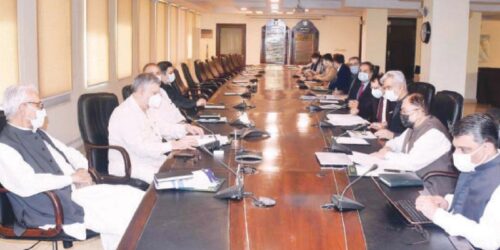He said Pakistan could also face problems in meeting oxygen supplies in case of an aggravating situation and the government was looking at ways and means to increasing oxygen production.
He said it was unfortunate that whenever Pakistan reached a stage to move towards economic turn around it had been hit by the Covid-19 for the third time and hence the government may have to pause for a while taking tough reform implementation schedule.
Secretary Power Division Ali Reza Bhutta while briefing the meeting about the progress on ongoing World Bank’s projects and programmes underlined that Pakistan was pursuing policy of targeted subsidies in the power sector. “The government is firmly committed to subsidy rationalisation (in phases) for bringing efficiency and improving service delivery”.
It was in this background that the government team floated the relaxing timelines on tariff adjustments and move ahead as the health pandemic and containment measures unfold.
Mr Tarin told the World Bank team that the government’s focus would be on socioeconomic development, better financial management, building resilient institutions, reforming energy sector, strengthening social sector and enhancing revenue generation during these testing times.
The World Bank appreciated the government’s relief initiatives to curtail the impact of Covid-19 effectively and reiterated continuous support to the government and people of Pakistan during the ongoing third wave.
The government had already shared a revised circular debt management plan with the World Bank that envisaged repeated tariff increases, buying out a number of old independent power plants, fuel conversions, tax rationalisations and timely subsidy payments over the next two years.
The WB had been informed that the government was committed to these set of measures otherwise, the circular debt would go beyond Rs4.7 trillion by end of FY23. The government has promised generating over Rs1.1tr additional funds from the consumers through tariff increases, besides improvement in billing recovery by 5pc to 96pc, reduction in system losses by about 0.7pc.
The average tariff is projected to be Rs20.25 per unit by FY23 from little over Rs15.4 per unit at present. The plan envisages that there would be no additional coal-based power plant in the near future and all of the already commissioned and under construction plants of about 5500MW on imported coal-based IPPs and Jamshoro-1 would be converted to Thar coal.
The plan also commits renegotiating the existing coal pricing formula with the government of Sindh by removing dollar indexation on their return on equity, shift coal transportation to railway and rationalise sales tax billing mechanism.
The plan says the general sales tax billed by IPPs was around Rs117bn but the GST billed to consumers stood at about Rs202bn which meant “excess GST” was going to the Federal Board of Revenue to the extent of Rs85bn. Removal of this discrepancy would have 85 paisa per unit impact on consumer tariff. Likewise, another Rs22bn saving is being envisaged to have 22 paisa per unit impact on consumers through adjustments in taxes on fuel (customs duty, GIDC, excise duty, import duty etc).
The government has already announced plants to buy out 11 IPPs of 3,300MW capacity at discounted value of about Rs150-200bn to be financed through sukuk and Pakistan Investment Bonds, otherwise they are entitled to about Rs450bn in aggregate capacity charges over the remaining seven years of their contracts.
The Power Division on the other hand also constituted a nine-member committee led an additional secretary power to consider such termination recommendations and future course of action after conducting detailed legal, technical and commercial analysis within parameters of power purchase agreements and implementation agreements with 11 independent power plants.





